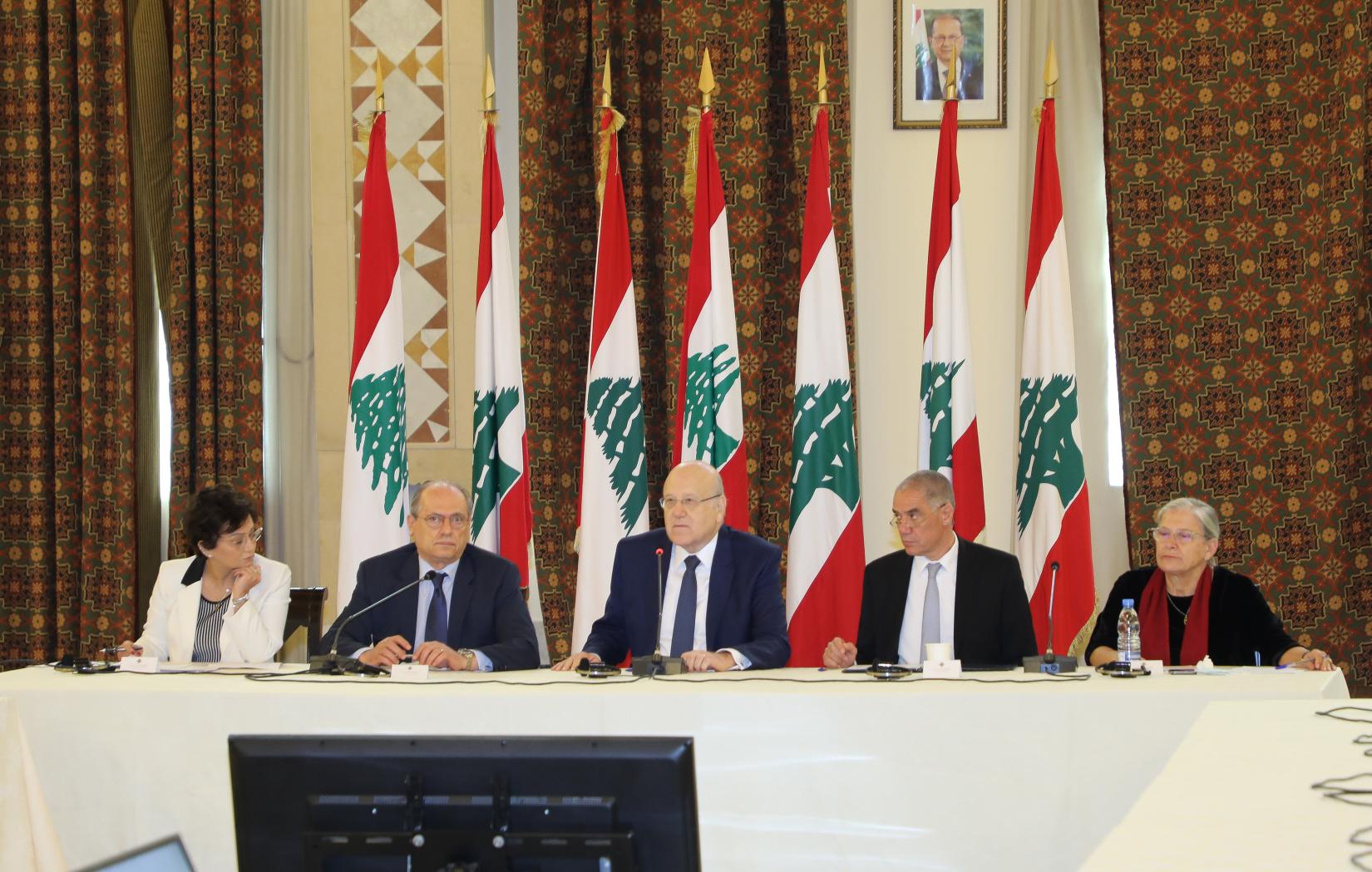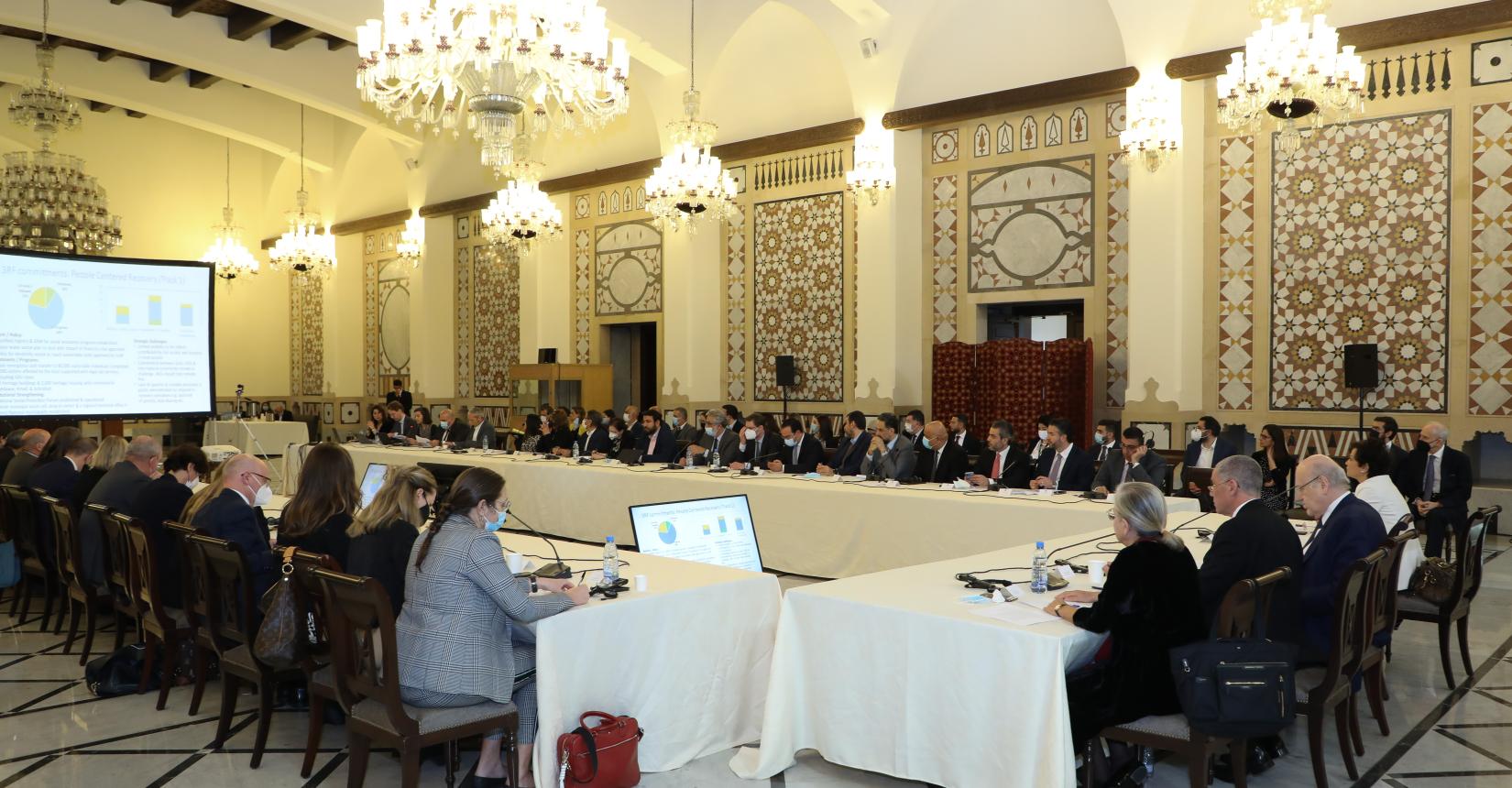Fourth Consultative Group Meeting on the Reform, Recovery, and Reconstruction Framework
04 April 2022
- Beirut, April 4, 2022 - The Consultative Group (CG) of the Reform, Recovery, and Reconstruction Framework (3RF) held its fourth meeting earlier today.

The 3RF Consultative Group consists of the Government of Lebanon, Lebanese civil society, the European Union, United Nations, the World Bank, and international donors. Together they monitor progress and give strategic direction to the reforms and activities under the 3RF.
The 3RF Consultative Group members took stock of the progress made to date under the 3RF supported programs and reiterated its call to address the protracted crisis. Discussions focused on three strategic issues, namely economic stabilization and recovery, social protection, and justice and accountability. Below are the co-chairs’ statement of the fourth 3RF Consultative Group meeting and the list of attendees.
The 3RF report and the Frequently Asked Questions (FAQ) on the 3RF can be found here.
***************
Co-Chairs' Statement of the Fourth Consultative Group Meeting:
- The fourth Consultative Group (CG) meeting of the Reform, Recovery and Reconstruction Framework (3RF) was held on 1 April 2022 at the Grand Serail, co-chaired by the Prime Minister of Lebanon, Lebanese civil society, the European Union and the United Nations.
- The CG witnesses the increasing despair of the Lebanese population. Delays in decision-making are leading the country towards a protracted and escalating humanitarian crisis. The people need to be put first. Lebanon needs to swiftly embark on a roadmap to exit this unfolding crisis through an agreement with the International Monetary Fund (IMF) and a comprehensive economic stabilization and recovery programme. A strong and nationally owned social protection programme will help safeguard Lebanon’s human and social capital. Justice and accountability are sine qua non for both.
- In the spirit of the 3RF, these are collective responsibilities. The CG acknowledges the difficult situation for the Lebanese Government, with the civil service not functioning at full capacity, a continuing refugee crisis, and the challenging global security and economic situation. The international community and civil society are committed to continuing to provide support in the interest of the Lebanese people. But the role of the Lebanese Government and Parliament cannot be substituted. Reforms are a necessity for recovery and not a request only from the international community. Lebanese Government and Parliament will have to find the political will to take collective steps beyond party politics; this will be an infusion of trust. The Government together with the Lebanese Civil Society should take ownership of the roadmap that the 3RF and its international partners offer, both at the strategic level in the CG and at a technical level through 3RF Working Groups. Now is the time for all of us to deliver results, better and faster.
- Eighteen months after the Beirut port explosion, the investigation is stalled again. The victims and their families, and the people of Lebanon have the right to know what caused the explosion and to hold those responsible for this tragedy accountable.
- Parliamentary elections are planned on 15 May 2022. The CG underlined the importance that Lebanese decision-makers take all measures and make available all necessary resources, including for the Supervisory Commission for Elections, to ensure fair, free, and transparent elections. The CG took note of the Parliament’s decision to postpone the municipal elections and emphasized the need to uphold all electoral milestones in line with Lebanon’s democratic principles and commitments.
- The 3RF Secretariat presented a 360-degree stock take. As an innovative and ambitious organizing principle, the 3RF has proved its concept; it should now deliver on results. In 2021, there has been a significant increase in funding under the 3RF, with disbursements reaching USD 204 million, and focused on people-centred recovery. These have spanned several sectors including social protection, education, health, housing, waste management and economic opportunities. The CG called on donors and international organizations to maintain and increase financial and technical support for the 3RF in 2022 and beyond.
- Coordination between state institutions on the 3RF was strengthened through the Central Management Unit (CMU) set up by the Prime Minister. This engagement should be stepped up, even after the elections, as much progress could be made even under a caretaker government. Civil society noted that the CMU was not as inclusive as committed to at the third meeting of the CG held on 16 November 2021. The Prime Minister confirmed his intention to invite Civil Society Organizations (CSOs) and other stakeholders when the CMU is well established.
- As implementation of the 3RF moves forward, the CG noted the importance of stepping up communications efforts highlighting the results achieved and their impact on people’s lives. Communications and outreach efforts should also address the citizens’ needs and challenges through an engagement platform that channels public views and concerns to relevant authorities and addresses queries and complaints promptly and efficiently.
- Discussion in the CG focused on three strategic issues: economic stabilization and recovery, social protection, and justice and accountability. Lebanon’s economic and financial crisis is estimated to rank among the top three most severe economic collapses worldwide since the 1850s. According to Government estimates, real GDP is estimated to have declined by 5 percent in 2021, on the back of a 21.4 percent contraction in 2020, whereas the 2022 real GDP growth rate in Lebanon is predicted to be at -2.5 percent. The CG calls for the urgent adoption and implementation of a credible, comprehensive, equitable reform plan that includes a debt restructuring programme that would achieve short-term fiscal space and medium-term debt sustainability; a comprehensive restructuring of the financial sector in order to regain solvency of the banking sector; a new monetary policy framework that would restore confidence and stability in the exchange rate; a phased, equitable, fiscal adjustment aimed at regaining confidence in fiscal policy; and growth-enhancing reforms. The Minister of Economy and Trade clarified in his intervention that the new Competition Law will open up investment in public services sectors to the private sector.
- The CG confirmed the central importance of justice, anti-corruption, and accountability. The CG reiterated its call for inclusive exchange of views between stakeholders before the adoption of the Independence of the Judiciary Law, with principles safeguarding the separation of powers. The CG welcomed the fruitful engagement between the Ministry of Justice and the Venice Commission, which has been requested to provide an independent legal opinion on the compliance of the draft Law with international practices. The CG commended the Minister of State for Administrative Reform for the progress made to implement the anti-corruption strategy and the associated Laws and decrees. The CG calls for the urgent mobilization of adequate resources for the National Anti-Corruption Commission to perform its duties. The Prime Minister also confirmed that the internal regulations of the National Human Rights Commission are ready to be adopted by the Council of Ministers once Parliament passes the budget.
- The CG also discussed Social Protection, commending progress in the establishment of a unified registry covering all social assistance programmes and the upscaling and implementation of the social assistance and services programmes (NPTP, ESSN). The CG called for the adoption of the draft National Social Protection Strategy as a matter of urgency to ensure that social protection goes beyond social assistance and includes social insurance, financial access to basic services, social welfare, and economic inclusion and labour activation. This strategy will be a vehicle for a new social contract between the people and the state, to anchor future international investments, and avoid a protracted humanitarian crisis.
- The CG praised the contribution of the first rotation of member civil society organizations, in providing strategic guidance, reviewing and monitoring implementation progress and advocating for various initiatives under the 3RF. The CG also wished the second rotation success, as well as the three additional members of the Independent Oversight Board (IOB). The IOB intervened to highlight the implementation of the Access to Information Law to reforms, crucial to enable more CSO involvement in the drafting of laws. The CG welcomed Norway and Sweden to the CG donor group. Donors agreed to continue to be represented by the European Union as co-chair of the CG.
The participants’ list is attached to this summary. Also, you can find here the presentation made by the 3RF Secretariat, a tracker of action points agreed at previous CG meetings, and a monitoring framework of all 3RF commitments.

Attendees in the fourth 3RF Consultative Group meeting
State Institutions of Lebanon
H.E. Najib Mikati, Prime Minister
H.E. Saade Chami, Deputy Prime Minister
H.E. Amin Salam, Minister of Economy and Trade
H.E. Hector Hajjar, Minister of Social Affairs
Ms Rubina Abou Zeinab, National Coordinator for the 3RF CMU
Mr Mohammed Itani, Economic Expert at the Presidency of the Council of Ministers
United Nations
Ms Najat Rochdi, Deputy Special Coordinator, Resident and Humanitarian Coordinator
World Bank
Mr Saroj Kumar Jha, Regional Director
Donors
H.E. Ralph Tarraf, Ambassador of the European Union
H.E. Andreas Kindl, Ambassador of Germany
H.E. Ann Dismorr, Ambassador of Sweden
H.E. Anne Grillo, Ambassador of France
H.E. Chantal Chastenay, Ambassador of Canada
H.E. Dorothy Shea, Ambassador of the United States of America
H.E. Hans Peter van der Woude, Ambassador of the Netherlands
H.E. Ian Collard, Ambassador of the United Kingdom
H.E. Marion Weichelt, Ambassador of Switzerland
H.E. Merete Juhl, Ambassador of Denmark
H.E. Nicoletta Bombardiere, Ambassador of Italy
H.E. Pierre Duquesne of France, Special Coordinator for International Aid to Lebanon
Mr Damien Sorrell, Representative for Lebanon of the European Investment Bank
Mr Khalil Dinguizli, Head of Lebanon for the European Bank for Reconstruction and Development
Mr Kiyoshi Mihara, Deputy Ambassador of Japan
Mr Svenn Wroldsen, Chargé d’Affaires of Norway
Mr Victor Hugo Portillo Angulo, Deputy Head of Mission of Spain
Lebanese Civil Society
Ms Asma Zein of the Lebanese League for Women in Business
Ms Alia Farhat of Al-Majmoua
Ms Carine Tohme of ALDIC
Mr Danny Aboud of the Lebanese Industrialists Association
Mr Eddy Bitar of Live Love
Ms Ella Bitar of the Society of St Vincent DePaul
Mr Nadim Abdo of Arcenciel
Ms Fadlo Dagher of BHI
3RF Independent Oversight Body (observers)
Mr Julien Courson of the Lebanese of Transparency International
Ms Reem Al-Dana of Kulluna Irada
Ms Roula Mikhael of Maharat
Ms Grace Eid of Nusaned
3RF Technical Team and Secretariat
Mr Christian de Clercq, UN Resident Coordinator’s Office
Mr Rein Nieland, EU Delegation Head of Cooperation
Ms Mouna Couzi, Lebanon Operations Manager and LFF Manager
Ms Judit Demjén of the 3RF Secretariat
Mr Khalil Gebara of the 3RF Secretariat
Mr Jaap van Diggele of the 3RF Secretariat













